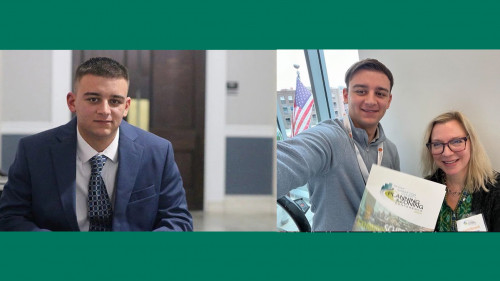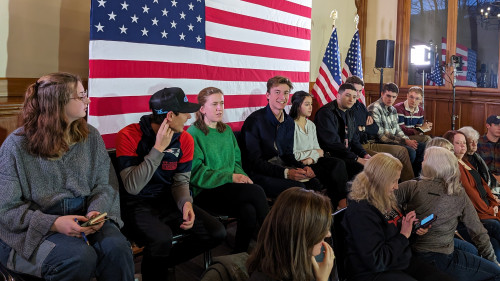
Sarah Falgiatano ’24 spent much of her summer researching the evolution of President Joe Biden’s foreign policy. Her hard work led to a presentation at a regional academic conference.
Falgiatano and her CURCA advisor, Leonard Cutler, Ph.D., professor of political science, presented jointly at the Northeastern Political Science Association’s annual conference held November 10-12 in Boston. Their topic? “The Assessment of the Biden Foreign Policy Doctrine.”
It’s not common for a college undergraduate to present at a conference at this level.
“It was a very eye-opening experience. I was the only person at the table who didn’t have a Ph.D.,” she said. “It was a little intimidating at first, but I became more confident. This is an experience I will hold on to for a very long time.”
Cutler and Falgiatano examined Biden’s foreign policy positions during his time as a senator, chair of the U.S. Senate foreign relations committee, vice president, presidential candidate, and now president. She did a deep dive into White House documents, news coverage, op-ed pieces and biographies, then synthesized her findings, which she and Cutler discussed and used to inform their presentation.
“I found this topic interesting because it is so current,” she explained. “We had to step back and take a very informed, very non-partisan look at his policies, which involved careful consideration of his choices.”
They noted a pattern throughout Biden’s career stressing the renewal of U.S.-led democratic alliances and an increase in multilateral cooperation. Their presentation featured mini-studies on Russia and Ukraine, as well as China and Taiwan.
Interestingly, their presentation required a last-minute change: President Biden was interviewed the prior Sunday on “60 Minutes,” where he offered his unequivocal commitment to defend Taiwan with U.S. forces in the event of a Chinese invasion. This statement was quickly walked back by White House officials and they reaffirmed their obligations previously agreed to in the Taiwan Relations Act.
The pair concluded that President Biden would have the American public believe that the world is currently “locked into a historic battle between autocracies and democracies” and that the fate of the 21st century will be determined by the resolve of democratic alliances to win that conflict under the leadership of the United States.
They stated that “the symbiotic alliances and partnerships that the United States has with NATO and with other countries in Asia are being used to directly address the issues in Ukraine and Taiwan,” but noted that “it is too premature to suggest that President Biden and his administration’s capacity to stitch these two together will be the hallmark of the Biden Doctrine of his presidency’s foreign policy.”
“Sarah was a dedicated researcher for our collaborative study on the Biden Doctrine,” said Cutler “I was pleased to have her see the fruits of her effort recognized in our presentation at our conference panel and to have the discussant note that our paper was excellent in terms of its quality and scholarship.”
Falgiatano encourages fellow undergrads to embrace academic opportunities that may seem intimidating at first.
“Don’t turn away from an opportunity like this because of fear you won’t be prepared,” she advised. “You’ll never be completely prepared until you go through the actual experience, and then you can keep building on it.”
Falgiatano is part of Siena’s 3+2 pre-law program, and after earning her bachelor’s degree here will go on to law school.

